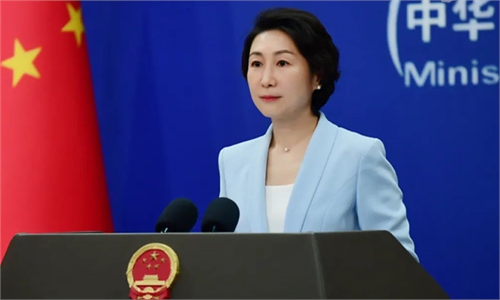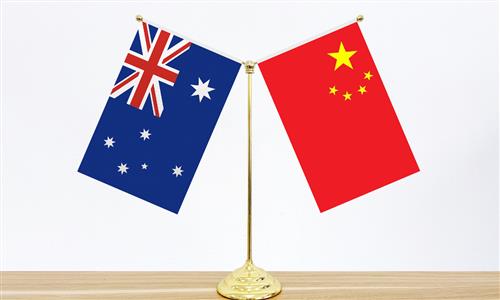Reliable partnership injects stability into the world: expert
China Australia photo: VCGAustralian Prime Minister Anthony Albanese has stressed the importance of Australia's ties with China during a press conference on Friday where he talked up his upcoming six-day visit to the country.
"I look forward very much to engaging with the Chinese leadership as well as visiting Shanghai, Beijing and Chengdu," Albanese said, stressing that one in four Australian jobs depend on trade, with about 25 percent of Australian exports heading to China, the Australian Broadcasting Corporation reported on Friday.
"The relationship with China means jobs in Australia. It's as simple as that," said the Australian Prime Minister.
Analysts said that Australia, as an export-oriented economy, is highly dependent on international markets, with China being a crucial destination for its exports. Maintaining stable trade relations with China is essential for the growth and development of Australia's export-driven industries. Beyond exports, Australia also has substantial import requirements from China. A more diversified and balanced trade relationship has the potential to create new opportunities and stimulate job creation in Australia.
At the invitation of Premier of the State Council Li Qiang, Australian Prime Minister Anthony Albanese will pay an official visit to China from July 12 to 18, according to the Chinese Foreign Ministry's website on Tuesday.
This would be Albanese's second visit to China as prime minister, according to a Reuters report. His 2023 visit to Beijing as prime minister broke a seven-year diplomatic freeze, and he emphasized the need for communication with China, despite differences between the two trading partners, said the Reuters report.
"China remains Australia's largest trading partner, accounting for almost one third of our total trade, and will remain so for the foreseeable future," Albanese said. "Trade is now flowing freely, to the benefit of both countries and to people and businesses on both sides. We will continue to patiently and deliberately work towards a stable relationship with China, with dialogue at its core," he added.
Days before he heads to China, Albanese told reporters in Hobart that "China's an important trading partner for Australia, 25 percent of our exports go to China… What that means is jobs, and one of the things that my government prioritizes is jobs," Bloomberg reported.
China has been Australia's largest trading partner, export destination and source of imports for 16 consecutive years. In order to seek to strengthen ties with China, discussions this time will focus on global and regional issues, plus bilateral cooperation on areas including trade and tourism. China accounts for nearly 26 percent of Australia's total goods and service trade, news.com.au reported on Tuesday.
The visit carries special significance as the start of the second decade of the China-Australia comprehensive strategic partnership. It also reflects Australia's desire to seek more reliable partners in an uncertain world order to create stability and certainty, with China being the obvious choice, said a Chinese expert.
Chen Hong, director of the Asia Pacific Studies Centre at East China Normal University, told the Global Times on Friday that Albanese's visit, which is longer than the usual two or three days, is expected to play an important role in regional stability and development, including upholding multilateralism and free trade.
Economic and trade relations serve as a stabilizer and booster for China-Australia relations, promoting their development, Chen said, adding that the strengthening of bilateral ties further drives economic cooperation, creating a mutually reinforcing dynamic.
For example, China provides a vast and stable consumption market for Australian minerals, wine, beef, lobster and other products. Meanwhile, Chinese products such as electric vehicles and home appliances have a significant market in Australia, Chen said.
"The Business Council of Australia is organizing the trade delegation which will depart Australia on Saturday. There'll be a range of activities in Shanghai. There'll be businesses travelling from Australia, but also ones that are Australian businesses based in China. There's a very successful Chamber of Commerce…in Shanghai, and I look forward to the visit," Albanese said during a press conference on Thursday local time.
According to media reports, in Beijing, Albanese will attend the annual meeting between the Chinese and Australian Prime Ministers, the China-Australia CEO Roundtable, and will also meet with Chinese leaders. There are also reports that Albanese may attend the third China International Supply Chain Expo.
A 14-person business delegation will also accompany Albanese for the Australia-China CEO Roundtable, which will include leaders from industries representing banking, resources, tertiary education and food.
This includes ANZ International's managing director Simon Ireland, BHP Australia president Geraldine Slattery, Fortescue Metals Group executive chairman Andrew Forrest, Rio Tinto chief executive Kellie Parker, SunRice chief executive Paul Serra and UNSW Vice-Chancellor and president Attila Brungs, according to local Australian media outlets.
The Australian Prime Minister will also visit Shanghai and Chengdu in Southwest China's Sichuan Province, where he will meet business, tourism and sport representatives and build on Australia's strong economic and trade links with China, according to a press release on the official website of the Australian prime minister on Tuesday local time.
Chen noted that Albanese's itinerary clearly indicates Australia's intention to deepen economic and trade cooperation with China, which brings renewed optimism for the future of China-Australia relations. Unlike his previous four-day visit, this trip spans a full week, highlighting its importance. The choice of destinations is also significant: Beijing for high-level dialogue, Shanghai for economic and trade exchanges, and the newly added city Chengdu, which reflects a deeper and more pragmatic cooperation between the two countries.
Chengdu, known for its innovation in technology, services, and entertainment industries, will offer new opportunities for collaboration, Zhou Mi, a senior researcher at the Chinese Academy of International Trade and Economic Cooperation, told the Global Times on Friday.
Beyond traditional areas of cooperation such as agriculture and mining, China-Australia collaboration is set to explore new frontiers. According to Zhou, the potential for cooperation in clean energy, green steel, finance, elderly care, and high-tech industries is vast. Tourism, steadily recovering since the pandemic, is another key area of cooperation that contributes to economic growth and people-to-people ties, he added.
At present, China has expanded visa-free entry to more than 70 countries. Citizens from these countries can now enter China for stays of up to 30 days without a visa. This list included Australian citizens, who since November were exempt from needing a visa for stays of up to 30 days, an extension of 15 days since it was first granted in July 2024. China has also long been a major source of international students and overseas tourists for Australia.
However, ahead of the anticipated visit, some voices in Australia are still attempting to magnify differences. Chen said these controversial voices do not represent the mainstream direction of bilateral economic and trade cooperation. It is normal for the two to have disputes, but the key lies in how to properly resolve them.
Chinese Foreign Ministry spokesperson Mao Ning said at a regular press briefing on Tuesday that the visit comes as the China-Australia comprehensive strategic partnership enters its second decade. "Under the guidance of the leaders of the two countries and with the joint efforts of both sides, China-Australia relations have continued to improve," Mao said.
"China is willing to work with Australia to take this visit as an opportunity to strengthen communication, enhance mutual trust, expand practical cooperation, and advance the comprehensive strategic partnership between the two countries," Mao added.
Source link https://www.globaltimes.cn/page/202507/1338132.shtml




No comments:
Post a Comment